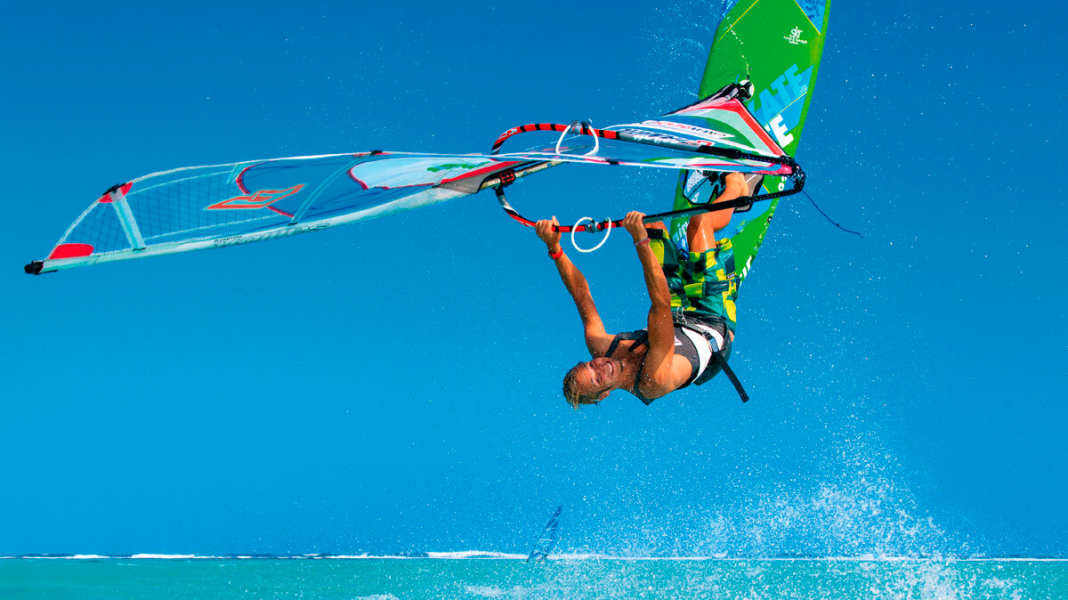
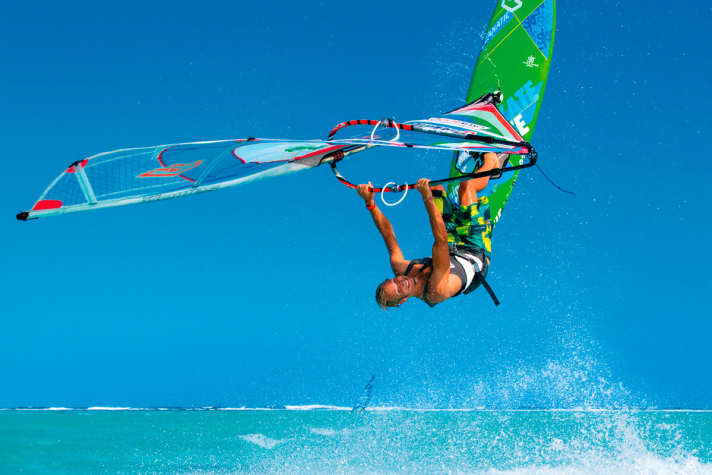
A Swiss snot spoon once put a 'Spock' in front of little Adi Beholz's nose on Lake Constance. That was a shock at the time. But it was also the first drop of fuel that has kept Adrian's dream engine running to this day. Today, the 24-year-old is one of the 16 best freestylers in the world. Adi was already on the straight path to becoming a concert musician. During winter training on the Caribbean island of Bonaire, the freestyle pro exclusively revealed to us what makes him every parent's nightmare, why tuna belongs in a board bag and what almost ended his career.
Adi, from Lake Constance surfer to best German freestyler in the World Cup - how does that feel? Yes, that's a real madness. As a young boy, I dreamed of maybe even being able to make a living from windsurfing, but that felt pretty unrealistic back then - especially when you grow up on Lake Constance. But then there's Tilo Eber, who no longer competes in the PWA World Tour, but still competes at national level and is pretty damn good.
You could also ask the question the other way round: Tilo Eber is gone, now you're the one left in the World Cup? You could say that too, definitely. But it has always been the case in windsurfing that others move up. I had predecessors André Paskowski, Normen Günzlein and Tilo Eber.
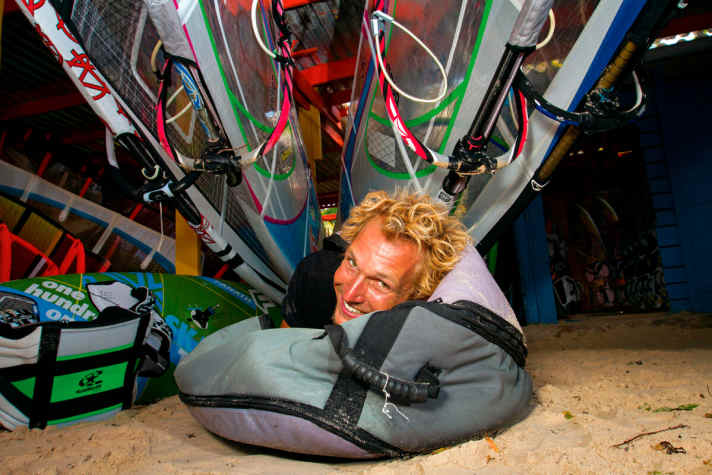
What's the situation with young freestyle talent in Germany? It's difficult to decide to become a professional freestyler in Germany. You have to put your professional career on hold for a few years and may never get round to studying. We currently only have one up-and-coming freestyler who is seriously planning to become a professional - that's Julian Wiemar from Erftstadt in the Rhineland. He is now 17 and has real potential. Marco Lufen from Tönisvorst near Krefeld is also a huge talent, but knows exactly that he will study after a year out. His international windsurfing career is then over - normally.
You come from Gaienhofen, a tranquil town on Lake Constance. Your father is an architect. That sounds like a dignified lifestyle. As a windsurfing dropout, you must be every parent's nightmare. Yes, that was me at school! I could never really get to grips with compulsory attendance or homework. When it was windy, those things were always cancelled and surfing came first.
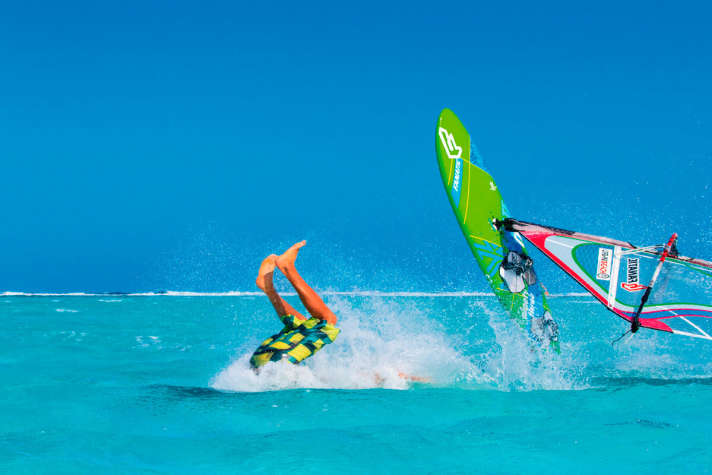
Did you feel like Youp Schmit from Bonaire, who accidentally met his teachers on the water while playing truant from school? Well, it was something like that. I was an external pupil at the boarding school in Gaienhofen. The school is located on a piece of land directly on Lake Constance. Behind the building, we windsurfers had a small cubbyhole for our equipment. When it was windy, we used to sneak out during the short break and the teachers would call after us from the shore. But as soon as we were outside, there was nothing we could do. The teachers were just too slow.
How did you get into freestyle? I started windsurfing in 1997. There was no freestyle back then. That only came about a year or two later. In 2001, I saw the first Swiss person attempting a 'spock' here on Lake Constance. I'd never seen anything like it before, it was a total shock. I immediately told my friend and we started practising straight away.
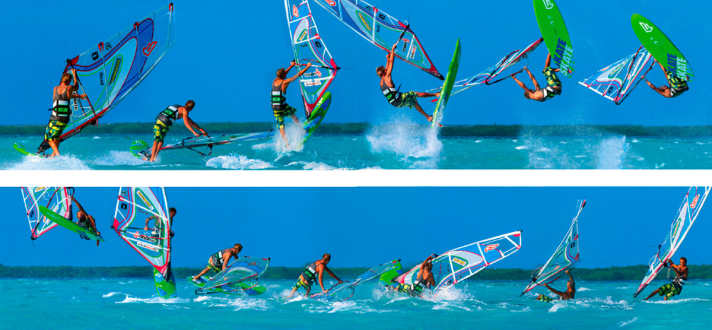
Hardly anyone realises that you would almost have pursued two completely different careers. Yes, that's right. Even as a child, I couldn't imagine having such a normal job. Back then, I was quite passionate about playing classical guitar. It came about because I really wanted a unicycle so I could do circus stuff. My mum dragged me to guitar lessons and promised that I would get the unicycle as a present if I practised on the guitar for a year. So I was bitten by the guitar and unicycle bug. I then really enjoyed playing the classical guitar and almost made it to the national competitions in the "Jugend musiziert" competition.
We would have loved to have seen that: Adrian Beholz playing the classical guitar! Yes! I sat there very well. Classical guitar is completely different to rock. But I wasn't wearing a suit!
Then came the change of heart that drove your parents crazy. However. I was supposed to do my A-levels. But I turned 18 just before half term in year 12, so I wrote my parents a long letter explaining that I actually already knew everything you can learn at school, that I had organised a job as a surf instructor in Soma Bay and was therefore going to stop school immediately. That really caused terror at home. My parents are actually free thinkers, my mum also stopped after the eleventh grade and took up pottery. But that was just too much. I finished twelfth grade with a technical college entrance qualification before I was finally allowed to earn my living as a windsurfer. The deal was that I had to finance my own life.
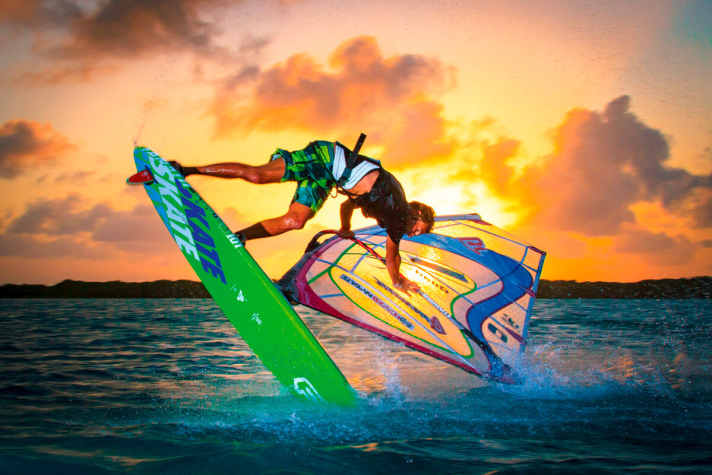
Is that even possible at that age? Yes, of course. I had a good job at a surfing centre in Turkey. With half a year's work, I was able to pay for half a year of travelling.
Among the windsurfing pros, you are considered to be the one who can live the most frugally and whose money lasts the longest. You sometimes sleep in your board bag if there's no other way. Is that true? Yes, I can really subscribe to that. For the first few years, I actually lived on two to three euros a day in winter. Before I left Germany, I stuffed the remaining space in my board bag with oatmeal and tins of tuna from Aldi. I had muesli for breakfast, pancakes for lunch and tuna noodles in the evening. That's how you can live very cheaply abroad. I now have a bit more of a budget, but it's still tight. As a windsurfing pro, you don't have a regular income. You have to keep an eye on the money all the time - but in my opinion that doesn't necessarily change the quality of life. Of course it's exhausting travelling 90 hours by bus in Brazil with your surf baggage because you can't afford a domestic flight. Here on Bonaire, I live ultra-affordably in Youp's surf hostel.
How many times a year are you in Germany? About seven times, including about twice at Lake Constance. I'm still a member of the Reichenau windsurfing club. At home, people treat me very respectfully. But most of the time I live in Kiel. My parents bought a small summerhouse there. It was pretty hardcore when I moved in there at the beginning of March a year ago. At minus 20 degrees and 50 centimetres of snow, I didn't know how to get the wood-burning stove to work. My brother and my dad had only just installed it and the chimney was too short. The smoke didn't come out and everything smelled like smoked herring for weeks. I could see it all over Kiel's face: Everyone asked themselves: "Why does this guy smell like that?" Whatever the weather, we had to trudge out to the well in the morning to fetch water, warm it up and only then could we start the day with a cat wash. But we've since upgraded.
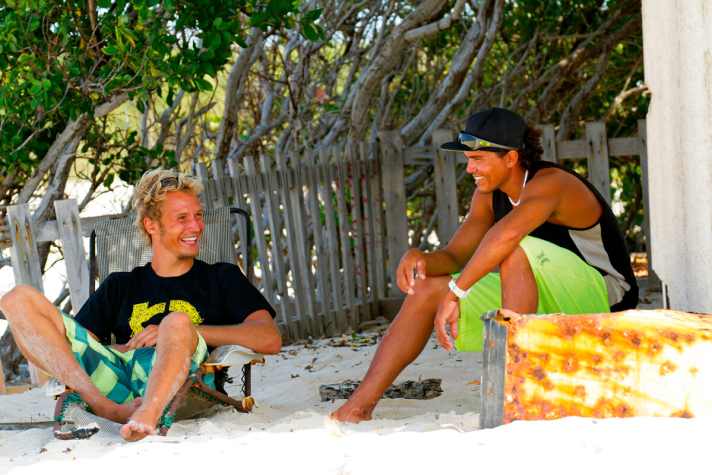
You've now made it into the extremely high-calibre field of the top 16 in the Freestyle World Cup. How much training time do you have to invest in order to keep up? I calculate at least 250 training days per year. When I started practising, I was miles away from the level of the others. I had to catch up. For an old hand like Tonky Frans, 150 days a year is certainly enough, but I have to train really hard.
You are now one of the very few people in the world who are able to jump a highly complicated move called Air Kabikuchi, which is named after a fish. How does it feel to be in this exclusive club? That's not bad, is it? But I think the next step feels even more awesome: The one when you invent your own move. We all have new ideas all the time. That's what makes freestyle so fascinating for me. Despite the extremely high level, you can always develop new moves. A few riders are working on completely new rotations. For a good year now, the "Pasko" has been the first 540-degree rotation jumped on flat water or even a 720-degree rotation jumped as a double air flaka in the air. Before that, everything was just 360 degrees in the air before you landed to jump like a rubber ball into the next rotation. Now we push much harder to pack more rotations into one move. It's an exciting development, but it's not without its risks. Youp Schmit from Bonaire is currently working hard on a new 720-degree move. There will also be a lot happening in the wave.
You've joined the big companies as a sponsor with Fanatic. Are you working your way into the surfing industry or do you want to do something else in the future when it comes to earning money? It can also happen to a windsurfing pro that they suddenly have children - perhaps without realising it... That can really happen! (laughs) I had been wondering for years whether I should go to university. But in 2012 I decided that I really just wanted to become a windsurfer. I plan to ride freestyle for the next ten years and get into the top ten. After that, I'll ride slalom until I'm 45 or so. At the same time, I'll build up the contacts for afterwards.
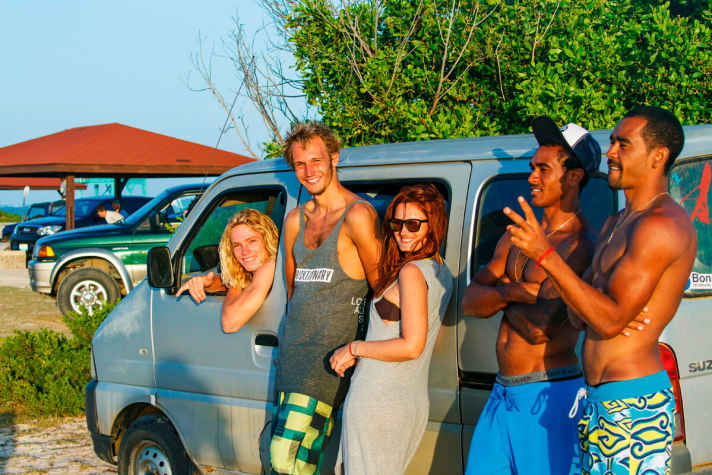
Are windsurfing careers like Robby Naish's still conceivable today? Well, Philip Köster is one example, but windsurfing isn't as big as it used to be. Philip is an incredibly good driving force for windsurfing in Germany. People are always talking about him and asking if they know him.
Do you know Philip Köster? Yes, of course!
And does he know you? I think so.
Your sailing sponsor is Sailloft from Hamburg. Would material development be a future mainstay? Sure. It's already a great collaboration. I'm always in the sailmaking workshop and we talk on the phone a lot. I was able to help develop the 'Quad' freestyle sail. We already had great feedback from the tests in 2012. I'm super happy with the 2014 version because we've achieved even more power and manoeuvre neutrality. My role is to identify the difference between what a prototype can actually do and what additional potential I feel it has. The sail designers then realise this technically. This is more complex than with surfboards, which are static bodies. Sails are moving bodies that are constantly deforming. Small changes in the cut can have enormous effects. You have to test that live.
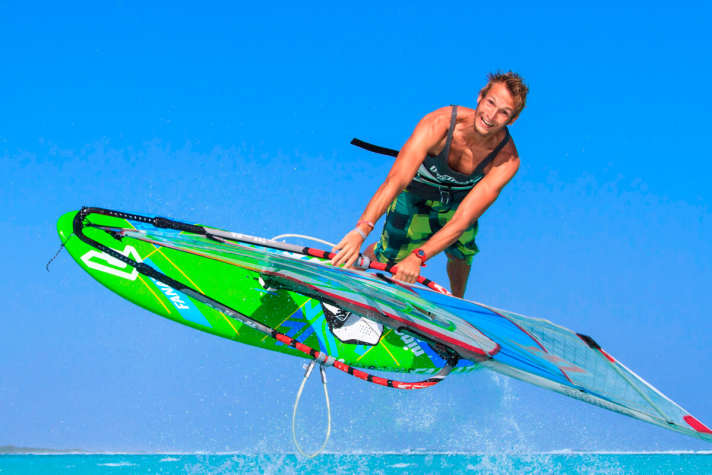
You recognised very early on that there were freestylers in Germany who wanted to compete with each other, but that there was no suitable format for them. That's right, I actually wanted to compete in the German Windsurf Cup, but the set-up didn't work out at all. That's why I launched the "German Freestyle Battles" in 2010 and found an ingenious setting at the time with the surf festival. Now Valentin Boeckler organises them because I'm always on the road. Valle came third last year and is a huge organisational talent. He was even able to organise prize money. This year there are two freestyle battles and even a tow-in event! Tilo Eber and I are still taking part and my plan this year is to finally win. Because the DM title belongs to the DWC, the German Freestyle Battles are not an official German championship, but the media coverage is great.
What would you wish for the development of windsurfing? I miss the passionate commitment to sport. We urgently need a united front instead of officials who are primarily concerned with their own financial well-being. We should all push windsurfing forward as a sport as best we can. It is simply the most fascinating sport in the world, and it will certainly live on as long as there is water, wind and people who love freedom.
You have a reputation for being a real party animal... That's right, there's always a party somewhere at the World Cups. I took full advantage of that when I was 18' and on the loose. I took everything I could get my hands on. That's where my reputation came from. But that has died down a bit. I actually only go to the closing parties at the World Cups now.
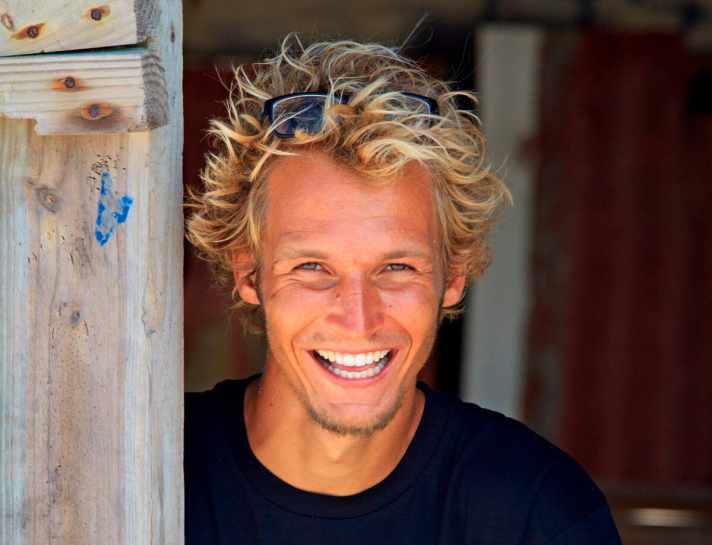
Aren't you worried that you'll be walking along the beach and people will be shouting 'Hello Dad' everywhere? (Ponders for a long time) I've had to deal with the issue very seriously. I had already received the news that I was going to be a father. That was a huge shock, because I had resolved to take full responsibility with all the consequences if it ever came to that. Of course, this would have been the complete end of my dreams. The main person involved decided not to have the child at the time, she was already a mother and in a committed relationship. In the end, I had to pay for the termination of the pregnancy, which is why I couldn't go on any more tour stops after Podersdorf in 2011. That's also the reason why my party life has calmed down a bit and I'm a bit more responsible today.

